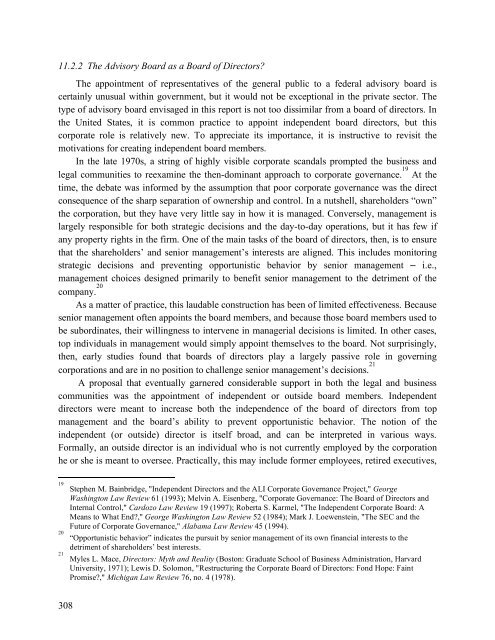Final Report (all chapters)
Final Report (all chapters)
Final Report (all chapters)
You also want an ePaper? Increase the reach of your titles
YUMPU automatically turns print PDFs into web optimized ePapers that Google loves.
11.2.2 The Advisory Board as a Board of Directors?<br />
The appointment of representatives of the general public to a federal advisory board is<br />
certainly unusual within government, but it would not be exceptional in the private sector. The<br />
type of advisory board envisaged in this report is not too dissimilar from a board of directors. In<br />
the United States, it is common practice to appoint independent board directors, but this<br />
corporate role is relatively new. To appreciate its importance, it is instructive to revisit the<br />
motivations for creating independent board members.<br />
In the late 1970s, a string of highly visible corporate scandals prompted the business and<br />
legal communities to reexamine the then-dominant approach to corporate governance. 19 At the<br />
time, the debate was informed by the assumption that poor corporate governance was the direct<br />
consequence of the sharp separation of ownership and control. In a nutshell, shareholders “own”<br />
the corporation, but they have very little say in how it is managed. Conversely, management is<br />
largely responsible for both strategic decisions and the day-to-day operations, but it has few if<br />
any property rights in the firm. One of the main tasks of the board of directors, then, is to ensure<br />
that the shareholders’ and senior management’s interests are aligned. This includes monitoring<br />
strategic decisions and preventing opportunistic behavior by senior management – i.e.,<br />
management choices designed primarily to benefit senior management to the detriment of the<br />
company. 20<br />
As a matter of practice, this laudable construction has been of limited effectiveness. Because<br />
senior management often appoints the board members, and because those board members used to<br />
be subordinates, their willingness to intervene in managerial decisions is limited. In other cases,<br />
top individuals in management would simply appoint themselves to the board. Not surprisingly,<br />
then, early studies found that boards of directors play a largely passive role in governing<br />
corporations and are in no position to ch<strong>all</strong>enge senior management’s decisions. 21<br />
A proposal that eventu<strong>all</strong>y garnered considerable support in both the legal and business<br />
communities was the appointment of independent or outside board members. Independent<br />
directors were meant to increase both the independence of the board of directors from top<br />
management and the board’s ability to prevent opportunistic behavior. The notion of the<br />
independent (or outside) director is itself broad, and can be interpreted in various ways.<br />
Form<strong>all</strong>y, an outside director is an individual who is not currently employed by the corporation<br />
he or she is meant to oversee. Practic<strong>all</strong>y, this may include former employees, retired executives,<br />
19<br />
20<br />
21<br />
Stephen M. Bainbridge, "Independent Directors and the ALI Corporate Governance Project," George<br />
Washington Law Review 61 (1993); Melvin A. Eisenberg, "Corporate Governance: The Board of Directors and<br />
Internal Control," Cardozo Law Review 19 (1997); Roberta S. Karmel, "The Independent Corporate Board: A<br />
Means to What End?," George Washington Law Review 52 (1984); Mark J. Loewenstein, "The SEC and the<br />
Future of Corporate Governance," Alabama Law Review 45 (1994).<br />
“Opportunistic behavior” indicates the pursuit by senior management of its own financial interests to the<br />
detriment of shareholders’ best interests.<br />
Myles L. Mace, Directors: Myth and Reality (Boston: Graduate School of Business Administration, Harvard<br />
University, 1971); Lewis D. Solomon, "Restructuring the Corporate Board of Directors: Fond Hope: Faint<br />
Promise?," Michigan Law Review 76, no. 4 (1978).<br />
308


